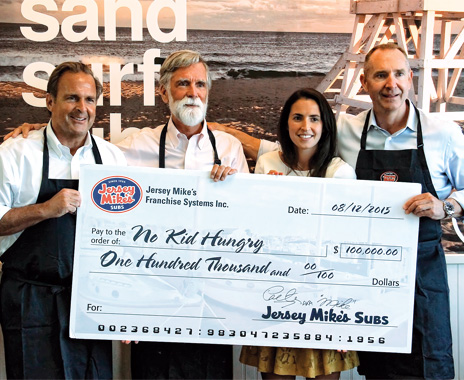When new franchisees sign on with Tropical Smoothie Café, they attend training sessions to learn everything they need to know about the concept, from product builds to customer service best practices.
But that also includes how to celebrate National Flip Flop Day to raise money for Camp Sunshine. In 2015, more than 430 Tropical Smoothie locations participated in the annual day designed to celebrate all things tropical by handing out free smoothies to flip flop–wearing guests. The company collected $1 million in donations for the Maine retreat that welcomes children with life-threatening illnesses and their families.
“That’s a part of who we are,” says CMO Lisa Dimson about the brand’s ongoing relationship with Camp Sunshine.
Whether focusing on a single cause like Camp Sunshine or supporting individual operators as they champion localized initiatives, many brands see charitable partnerships as an opportunity to give back to the customers who support their businesses.
New franchisees at Jersey Mike’s Subs learn about the Month of Giving, which culminates on the Day of Giving where 100 percent of store profits are donated to the franchisee’s charity of choice. During the fifth-annual Month of Giving in 2015, more than $3 million was raised for 150 charities.
Both concepts emphasize giving back and approach it with year-round efforts culminating on one big day. The main difference is that one focuses on a single cause nationally, while the other supports a variety of causes on a local level.
No matter which of these approaches a brand takes, Gail Bower, president of Bower & Co. Consulting LLC, a corporate sponsorship consultancy, says finding the right charity partner takes time and effort, but if done right, it brings many benefits.
She adds that it’s important for companies to find causes aligned with the interests and passions of the target audience. For example, a quick serve that targets teens might consider partnerships with youth sports or education-related causes.
To stress how important giving back has become, Bower cites a 2015 study by Cone Communications/Ebiquity Global, which found that 90 percent of global consumers would switch brands to one supporting a cause.
Tropical Smoothie has focused all of its charitable giving energies on Camp Sunshine since 2006. Dimson says she is often asked how a company founded in Florida and now based in Atlanta got so involved with a camp in Maine.
“Our CEO was seeking out different organizations and felt so moved by Camp Sunshine. … There were other considerations, but this was the one that seemed to stand out for us,” Dimson says. Given Tropical Smoothie’s growth, some suggested the brand support groups with a higher mass media appeal, but Dimson says that was not the focus. “We started this journey with this camp, and we have fallen in love with the people who run this camp and with the children. Once you build that relationship, you don’t walk out the door.”
Bower says that for a brand to achieve a relationship as fulfilling as the one Tropical Smoothie has with Camp Sunshine, the search for a charity partner must begin with a strategy.
Dave Altmann, senior vice president of strategic initiatives at Jersey Mike’s, says franchisee input drives the brand’s efforts.
Once franchisees identify a viable charity, Jersey Mike’s works with them to “drive it home.” Company leadership suggests to franchisees that after successfully working with a nonprofit for one year, they commit to three more years with the same group to build momentum. And while Jersey Mike’s lets franchisees choose partner organizations, corporate management offers advice.
“We give franchisees a voice, but there have been situations where we’ve said maybe you want to steer away from things that are politically driven. Most franchisees were able to understand,” Altmann says. “There are plenty of great charities out there, and we don’t want it to be about anything but the good nature of the charity.”
Jersey Mike’s franchisees work with a variety of charities, but they all have one thing in common: what they get back. Altmann says it’s not about a measurable increase in business so much as a feeling of goodwill.
Joining other restaurants nationwide, many Jersey Mike’s franchisees, as well as CEO and founder Peter Cancro, support No Kid Hungry and its “Dine Out for No Kid Hungry.” In August, Cancro donated $100,000 to the organization, which is committed to ending childhood hunger.
Jennifer Kaleba, senior communications manager for No Kid Hungry, says three groups benefit when restaurants like Jersey Mike’s participate in the campaign.
“You choose the way to participate that suits your brand and your business and your community,” she says, adding that the bounce-back coupon model is a popular option. “If a customer gives $1 to the organization at the register, they get a coupon for $2 off at their next visit. The charity gets the donation, the consumer gets added value, and the restaurant gets an opportunity to get the customer back.”
Bower says the ultimate goal of a partnership between a business and a charity is all parties coming away with benefits. She adds that some partnerships are long-term but others align only for a short time due to differing expectations or uneven efforts. In general, though, Bower suggests giving partnerships plenty of time to develop.
“I would encourage giving any partnership with a nonprofit at least three years to work out the kinks,” she says. “It takes time, but has huge payoffs.”






